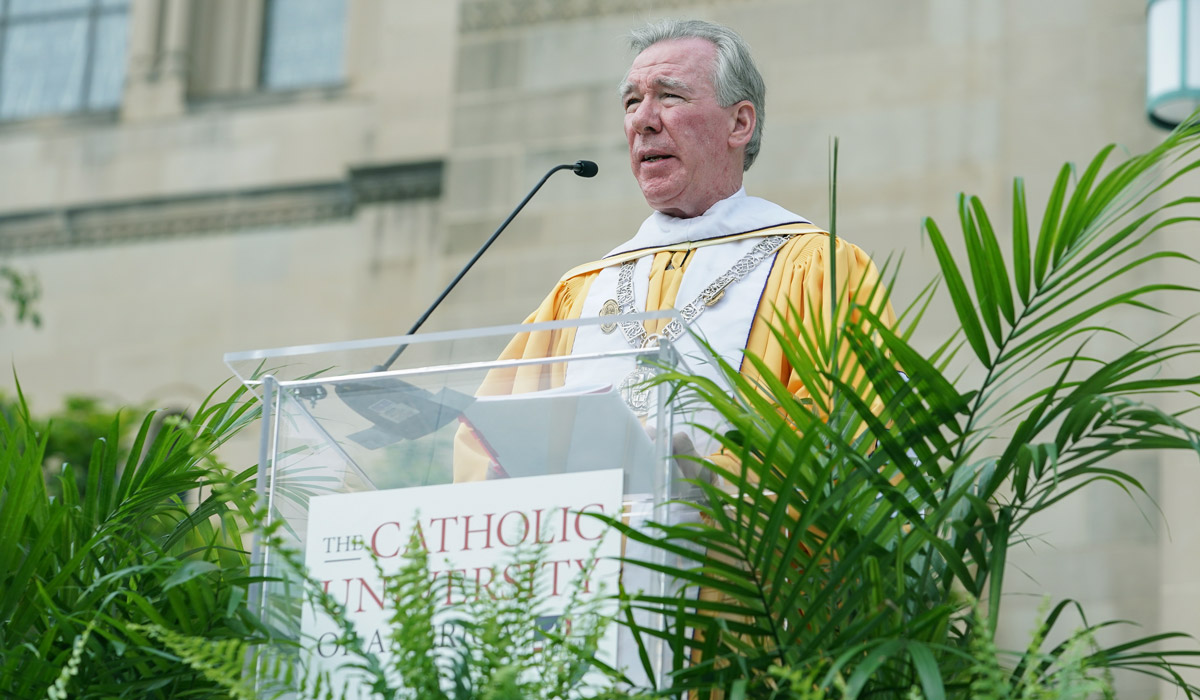

John Garvey, President of The Catholic University of America
Commencement Remarks
130th Annual Commencement
East Portico, Basilica of the National Shrine of the Immaculate Conception
May 18, 2019
Today is the feast of St. Venantius, who was martyred in the year 250 at the age of 15. When he learned he was about to be arrested Venantius turned himself in to Antiochus, the governor of Camerino, and began preaching to him. Butler’s Lives tells us that “[w]hen it was found impossible to shake his constancy either by threats or promises, he was condemned to be scourged, but was miraculously saved by an Angel.”1.
For several days after that Venantius was treated like some character in a bad Steven Seagal movie (Hard to Kill). His persecutors tried every way they could to kill him. The burned him with torches, then suspended him over a low fire so the smoke would suffocate him. An angel stamped out the fire. They threw him to the lions, but the lions crouched at his feet. They threw him over a cliff. They broke his teeth, dragged him through thorns, put him in a furnace. Angels rescued him each time. Eventually the governor threw in the towel and had him decapitated.
Venantius exhibited in extreme form the virtue I want to commend to you: constancy. It is a graduation virtue. We pledge it in yearbooks: “Best friends forever.” (Or my personal favorite, “Stay the way you are and you’ll never change.”) The Beach Boys adjure us to “Be true to your school.”
Part of the explanation for that is nostalgia, a reluctance to let go. Aquinas observes that “[o]ne is said to be constant because one stands to a thing.”2. But what is so praiseworthy about standing still? Perched on the verge of your careers, you probably have higher ambitions – to be a doctor; to land on the moon; to cure cancer; to be president. These dreams seem inconsistent with a virtue whose distinguishing feature is unchangeability.
But I’m not sure they are, if we envision the right kind of stillness. Think of a compass. The thing about a magnetized needle is that it never moves, no matter your weather or position. It doesn’t get distracted by passing attractions.
This surprising steadiness would be interesting, if that were all. What makes it a big deal is that the needle always points north. The virtue of constancy has this quality too. It points in a particular direction, a kind of true north outside our control. Constant attention to taste or fashion is not a virtue, only a hobby. Constant preoccupation with drugs is a vice. The virtue of constancy points us in another direction.
There is a wonderful little poem by George Herbert that makes the point. Herbert was a friend of Francis Bacon. His mother was a patron of John Donne, the metaphysical poet he closely resembles. Herbert gave up being Public Orator at Cambridge to live the simple life of an Anglican rector in a small village near Salisbury. Apart from tending his flock he preached and wrote poetry. One poem, for the second Sunday of Lent, is entitled Constancy. It begins:3.
Who is the honest man?
He that does still and strongly good pursue,
To God, his neighbor, and himself most true:
Whom neither force nor fawning can
Unpin, or wrench from giving all their due.
The virtue of constancy points still and strongly toward the good. It directs us to be true to God, our neighbors, and ourselves.
Think about the biggest commitments you make in life. The faith described in Deuteronomy is a rule of constant attention: “I am the Lord your God . . . . You shall have no other gods before me.” Your marriage vow is a promise of constancy: to have and to hold, from this day forward, for better, for worse, for richer, for poorer, in sickness and in health, till death do us part. A lawyer admitted to the bar takes a vow: to “bear true faith and allegiance to the Commonwealth of Massachusetts . . . .” The Florence Nightingale Pledge is also one: “I solemnly pledge myself before God . . . to pass my life in integrity and to practice my profession faithfully.”
None of this is inconsistent with running for president, but it does mean that getting elected is not itself our true north. We should aim instead at the good we can do, and if that takes us to the Oval Office, so be it. Herbert says of the constant man that he
. . . when great trials come,
Nor seeks, nor shuns them; but does calmly stay,
Till he the thing and the example weigh:
All being brought into a sum,
What place or person calls for, he does pay.
My father was a small town lawyer who never left home except to attend school and fight the war. He had many admirable qualities. And among them was a trait his children came to know him for: you always knew exactly where he stood on life’s important issues. He would calmly stay when great trials came. After a while you didn’t even have to ask for his advice. You knew he would be pointing north, and you knew where that was.
That is what I wish for you in thirty years. I want your spouse and children and your friends to be able to say: “He was someone I could depend on.” "I knew where she stood." So be constant. Be true to God, your neighbor, and yourself. God bless you.
1. Les Petits Bollandistes: Vies des Saints, by Msgr. Paul Guérin (Bloud et Barral: Paris, 1882), Vol. 5; Little Pictorial Lives of the Saints, a compilation based on Butler's Lives of the Saints and other sources by John Gilmary Shea (Benziger Brothers: New York, 1894)
2. Thomas Aquinas, Summa Theologica, IIa IIae, Q. 137, art. 3.
3. George Herbert, The Temple (1633).
.